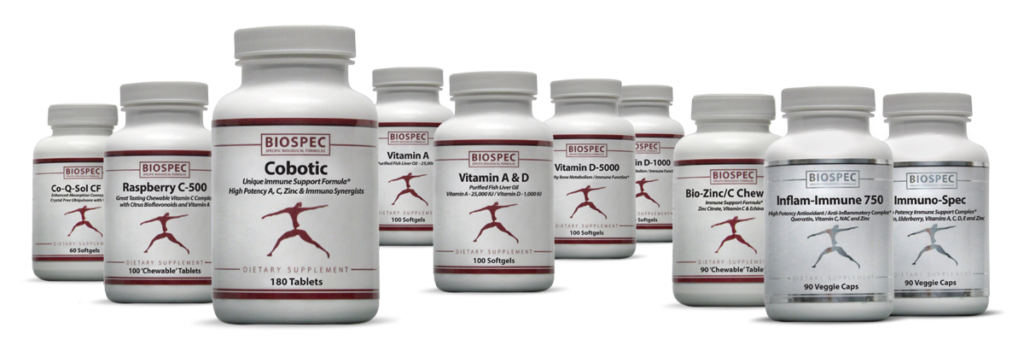
Cold and Flu Season: Defend Yourself
As the Holiday season fades into memory, a new season gradually takes hold. Overwhelmingly regarded as a time for welcoming growth, goals, and change, the post-holiday winter months are also recognized as the height of cold and flu season. But why is this so?
When considering the shortage of sunlight (the stimuli for vitamin D synthesis), the additional time spent indoors around others, the cold dry air that promotes virus survival, and the neglect of self-care and additional stress that weakens an already burdened immune system, the connection becomes clear as to why the common cold and flu peak during the holiday and post-holiday months. Of course, much can be done to lessen the likelihood of infection. And while a healthy diet, sufficient sleep, stress management, and good hygiene practices are excellent mitigating factors, it’s prudent to remain mindful of additional strategies that serve to boost immune function, especially when evidence is largely supportive of their efficacy.
At clinically-relevant doses, certain vitamins, minerals, and other compounds have shown to support the activities of the immune system against various pathogens, especially those encountered regularly during the cold and flu season. Though most immune-promoting nutrients are accessible as part of a healthful and well-balanced diet, their availability may fail to reach clinical significance from food alone. Take vitamin D3, for example, which is negligible in most foods, yet may be required at doses exceeding the 600 IU/d (recommended by the Institute of Medicine) to modulate innate and adaptive immunity in several acute and chronic conditions. When seeking to improve nutrient status without significant changes to established eating patterns, supplementation can be a very reasonable and cost-effective strategy.
Cobotic, a formula by BioSpec Nutritionals, includes an evidence-based blend of ingredients identified for their immune supportive properties, especially during times of increased infectious burden and stress.*

COBOTIC INGREDIENTS
Vitamin A: One of the immune system’s first lines of defense is found within the mucus membranes of the airway passages, the digestive lining, and also the urinary tract. Vitamin A is essential, not only to maintain the integrity of the mucus membranes, but also to support the production of inflammatory factors necessary to fight infection.⁵
Vitamin D: Vitamin D has been touted in mainstream medicine to have a beneficial effect on both innate and adaptive immunity, meaning that it supports and enhances the body’s preprogrammed (innate) defenses, in addition to immunity that develops over time from continuous exposure to foreign substances.⁶ It has been well established in the scientific literature that suboptimal levels of vitamin D can lead to a lowered state of immunity, increasing the risk of infection and associated complications.
Zinc (Picolinate): Zinc picolinate, the most bioavailable form of zinc, is similar to vitamin D such that it supports both adaptive and innate immunity required for the normal development and function of the immune system.⁷ Studies have shown that in children, zinc deficiency can be a contributing factor in diarrheal diseases and lower respiratory infections, primarily pneumonia and flu.⁸⁻⁹ In aging populations it is not uncommon to find significantly diminished zinc levels, which can influence age-related immune decline.¹º
Copper: It is well-known that copper deficiency can result from long-term zinc supplementation at higher doses.¹² As such, balancing the zinc-to-copper ratio in supplements is necessary to avoid potential copper deficiencies and complications that may result. Copper deficiency can lead to a decreased number or response of specific subgroups of white blood cells. Though much has yet to be clarified in this regard, the relationships between copper and the innate immune system, specifically against bacterial pathogens, remains an important consideration.¹³
Lemon Bioflavonoid Complex: Bioflavonoids are compounds found in foods that have many biochemical and physiologic actions that include antioxidant, anti-inflammatory and anti-viral effects to help boost the immune system.¹⁴⁻¹⁵
Echinacea Purpurea Extract: Published trials have suggested that Echinacea may be beneficial for the prevention of early onset upper respiratory tract infection.¹⁶⁻¹⁷
Lysozyme: Lysozyme is an antimicrobial protein that is secreted by intestinal cells in the presence of a bacterial invasion.¹⁸
L-Lysine: Studies have shown that L-lysine may be beneficial for the prevention and treatment of herpes simplex outbreaks.¹⁹⁻²⁰
References:
- Jariwalla RJ, Harakeh S. Antiviral and immunomodulatory activities of ascorbic acid. In: Harris JR, ed. Subcellular Biochemistry. Vol. 25. Ascorbic Acid: Biochemistry and Biomedical Cell Biology. New York: Plenum Press; 1996:215-231.
- Prinz W, Bortz R, Bregin B, Hersch M. The effect of ascorbic acid supplementation on some parameters of the human immunological defence system. Int J Vitam Nutr Res. 1977;47(3):248-257.
- Vallance S. Relationships between ascorbic acid and serum proteins of the immune system. Br Med J. 1977;2(6084):437-438
- Hemila, H. Vitamin C and Infections. Nutrients. 2017 Mar 29;9(4)
- Raverdeau M, Mills KH. Modulation of T cell and innate immune responses by retinoic Acid. J Immunol. 2014;192(7):2953-2958.
- Aranow C. Vitamin D and the immune system. J Investig Med. 2011;59(6):881-886.
- Maares M, Haase H. Zinc and immunity: An essential interrelation. Arch Biochem Biophys. 2016;611:58-65.
- Black RE. Progress in the use of ORS and zinc for the treatment of childhood diarrhea. J Glob Health. 2019;9(1):010101.
- World Health Organization. Global health risks: mortality and burden of disease attributable to selected major risks. 2009.
- Mocchegiani E, Romeo J, Malavolta M, et al. Zinc: dietary intake and impact of supplementation on immune function in elderly. Age (Dordr). 2013;35(3):839-860.
- Barrie SA, Wright JV, Pizzorno JE, et al. Comparative absorption of zinc picolinate, zinc citrate and zinc gluconate in humans. Agents Actions. 1987;21:223-228.
- Rowin J, Lewis SL. Copper deficiency myeloneuropathy and pancytopenia secondary to overuse of zinc supplementation. J Neurol Neurosurg Psychiatry. 2005;76(5):750-751.
- Hodgkinson V, Petris MJ. Copper homeostasis at the host-pathogen interface. J Biol Chem. 2012;287(17):13549-13555.
- Peterson J, Dwyer J. Flavonoids: dietary occurrence and biochemical activity. Nutr Res. 1998;18:1995-2018.
- Middleton E Jr. The flavonoids. TIPS. 1984;5:335-338.
- Barrett B. Echinacea for upper respiratory tract infection. J Fam Pract. 1999 Aug;48(8):628-635.
- Sholto D, Cunningham R. Echinacea for the prevention and treatment of upper respiratory tract infections: A systematic review and meta-analysis. Complementary Therapies in Medicine. 2019 Mar; 44
- Bel S, et al. Paneth cells secrete lysozyme via secretory autophagy during bacterial infection of the intestine. Science. 2017;357(6355):1047-1052.
- Griffith R, et al. A multicentered study of lysine therapy in herpes simplex infection. Dermatologica. 1978;156:257-267.
- McCune M, et al. Treatment of recurrent herpes simplex infections with L-lysine hydrochloride. Cutis. 1984;34:366-373.
Medical Disclaimer: This content is for informational and educational purposes only. It is not intended to provide medical advice or take the place of such advice or treatment from a personal physician. All readers/viewers of this content are advised to consult their doctor or qualified health professional regarding specific health questions. Neither BioSpec Nutritionals, Practitioner Supply nor the publisher of this content takes responsibility for possible health consequences of anyone reading or following the information in this educational content. All viewers of this content, especially those taking prescription or over-the-counter medications, should consult their physicians before beginning any nutrition, supplement or lifestyle program.
*These statements have not been evaluated by the Food and Drug Administration. These products are not intended to diagnose, treat, cure or prevent disease.

Consider Cobotic and other formulas for specific Immune Health support:
- Cobotic
- Co-Q-Sol CF 100
- Vitamin A
- Vitamin A & D
- Vitamin D 1000
- Vitamin D 5000
- Raspberry C-500 (chewable)
- Bio-Zinc/C (chewable)
- Inflam-Immune 750
- Immuno-Spec
__________
To preview original emailed newsletter, which includes related resources and links, go to:

